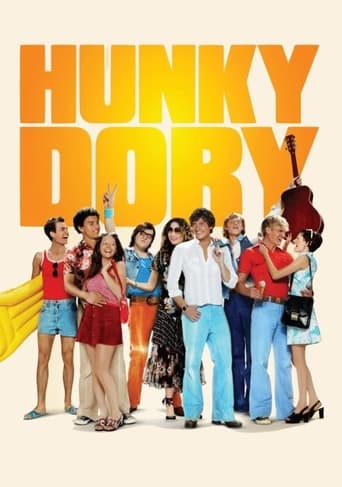johnbalance
Anyone who was around in the 70's and think this will provide an accurate nostalgia trip will be disappointed. The hairstyles, at least those of the male actors, are far too modern looking for 1976. The Incredible Hulk TV show is referenced two years before it aired (at least we can safely assume it's the TV show, it's highly unlikely the scriptwriters had the Marvel Comic in mind). More lazy 70's pop culture tropes follow. As someone else pointed out almost no one in the UK would have heard of The Ramones at this stage outside of a tiny London punk clique.Characters are too thinly sketched. One main female characters romance with a DJ she spots at a Northern Soul venue seems like an afterthought. The ending is laughable with a fictional montage of "what they did next" character biographies that try to add meat to the sketchy ensemble
asorednop
I can't disagree with much of the criticism here. There are too many story arcs and few are given enough screen time (one, about questioning one's sexuality seemed to be over in less than 60 seconds in entirety, and without any resolution that particularly adds anything). I'm just about old enough to remember the summer of 1976 and the film didn't feel historically accurate, either. Rather than reminisce, I had to keep reminding myself it wasn't set in the modern day.However, there were good things. The acting and singing, both from Minnie Driver and her charges, is good throughout. Aneurin Barnard and Danielle Branch stand out as the erstwhile couple who are acrimoniously failing to maintain a working relationship as leads in school's production of The Tempest. Both have a brooding intensity and use their eyes to great effect. For me, the standout moment was during the final production, singing "Life On Mars?" as a duet; him, looking away, still unable to meet her eyes even once, and her, the polar opposite, never wavering in her direct and angry gaze, spitting the words at him. In the penultimate moments of the song, her expression changes entirely from anger to loss, perhaps finally realising that nothing can be salvaged between them. And then, the final scene, she is still staring intently at him, but she is looking upon him almost as a stranger now, as ex-lovers invariably become. It's very well acted, demonstrating these sudden realisations only with her eyes and having them mirrored with an acceptance or at least acknowledgement of defeat in his eyes too.I wasn't expecting to like it, but I did. If you follow the advice given to Minnie Driver's character in the film about keeping your expectations low and don't approach this film as high art, you may find yourself enjoying it. If nothing else, the music is really very good indeed.
Bethan Lloyd-Thomas
Set in the 70s in South Wales, this film/musical doesn't disappoint. Not only is there a spectacularly eerie arrangement of music but the characters stories are relatable. The problems these teenagers face range from Homosexuality to peer pressure to family tension. What makes it more interesting (though it's a simple idea) is that it's a musical about making a musical. This gives the excuse for the atmospheric soundtrack, sung by the cast themselves. Completely different to any other musical I have seen. The only thing I didn't like were the predictions of the characters lives at the end of the film. This seemed like a desperate attempt to make the film more believable when it already was quite so. Although, I am willing to overlook this as the film is such a good one.
smallasianman
I usually despise musicals. I cringe at the sight of teenagers wearing pasted-on smiles, belting out show tunes whilst mid-conversation with stern authority figures. Yet Marc Evans' Hunky Dory seeks to counter the contrivance of High School Musical and Glee, instead presenting us with a naturalistic drama that explores the lives of a dreamless bunch of kids in pre-Thatcher South Wales. Despite facing their last summer holiday before being destined for mediocrity, free-spirited drama teacher Vivienne May (Minnie Driver) wants her class to put on an end of year production of The Tempest "that William Shakespeare and David Bowie would be proud of" in order to give them some lasting hope of achievement. The film follows the cast as they seek to produce a "Shakespearean concept rock opera", despite disapproval from conservative teachers, prejudiced rugby coaches and skinhead relatives. The youngsters' talents shine through, with the 1976 backdrop meaning ensemble performances of the likes of David Bowie, Nick Drake, ELO and The Beach Boys. There is a strong feel-good vibe to Hunky Dory, which dances between comedic musical and nostalgic drama with some success. Several character arcs map the cast's progression through the stereotypical hurdles of adolescent strife – but all's well by opening night, when the class perform relatively unscathed. However, there is a great failing in Hunky Dory due to its poverty of originality. The setting and story borrow heavily from Richard Linklater's Dazed and Confused and School of Rock, whilst the students' individual stories aren't given time to develop, and so seem to be pulled straight from Skins and Cemetery Junction. Perhaps Marc Evans bit off more than he could chew here. I imagine that Hunky Dory would play out quite well as a TV mini-series, and perhaps the predictable plot and two-dimensional characters may simply be a result of it being confined to 110 minutes. Nonetheless, the film is an easy watch, especially the final rendition of Life On Mars?, which is performed impeccably. Expect some warm chuckles in the hazy Welsh sunshine, but not riotous laughs. Hunky Dory won't ever have you on the edge of your seat, but its pleasant enough to keep you in it.



